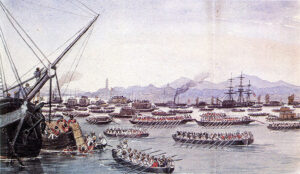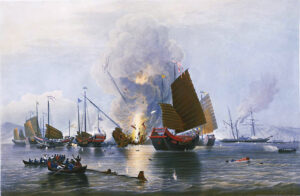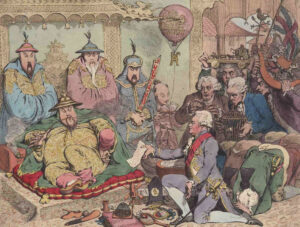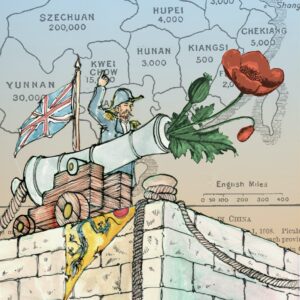In the mid-19th century, the First Opium War erupted between Britain and China, primarily caused by trade imbalances and underlying tensions over sovereignty and the opium trade. This pivotal conflict ultimately resulted in the cession of Hong Kong to the British, marking a crucial turning point in history. Let’s delve into the causes, events, and consequences of this war that forever changed the relationship between two world powers.




Trade Imbalances and Tensions:
During the 19th century, China’s economy flourished, while Britain sought to expand its trade routes and find new markets. However, China’s stringent restrictions on foreign trade hindered British ambitions, creating significant trade imbalances. The Chinese government’s ban on the import of goods other than silver led to a drain of silver from Britain’s coffers, exacerbating the economic situation.
Opium Trade and the Canton System:
To counterbalance these trade imbalances, British merchants entered into the highly lucrative opium trade. Opium, grown in British India, became a highly sought-after commodity in China. However, the Chinese government saw addiction and social degradation caused by opium consumption as severe issues and restricted its import.
To control foreign trade, China implemented the Canton System, confining trade solely to the port of Canton (now Guangzhou) while imposing various regulations on foreign merchants. This system, combined with the strict monopoly established by the Chinese government, further aggravated tensions between Britain and China.
The Spark of the First Opium War:
As the British opium trade grew exponentially, the Chinese government attempted to crack down on this illegal and harmful trade. In 1839, the Chinese Imperial Commissioner, Lin Zexu, seized and destroyed large quantities of British-owned opium in Canton. This act, known as the “Opium Destruction,” infuriated the British merchants and led the British government to seek compensation for their losses.
The Conflict Unleashed:
In response to the Opium Destruction, the British dispatched military forces to protect their commercial interests in China. In 1840, the First Opium War officially began as British warships bombarded Chinese coastal forts. Superior British naval power and advanced weaponry provided them with a clear advantage over the Chinese forces.
The Treaty of Nanking and the Cession of Hong Kong:
The war concluded in 1842 with the signing of the Treaty of Nanking. The treaty outlined several significant changes, including the cession of Hong Kong Island to the British, the opening of five treaty ports for trade, and the establishment of extraterritoriality for British citizens. Additionally, the treaty forced China to pay substantial reparations to Britain and grant them most-favored-nation status, significantly undermining Chinese sovereignty.
The Impact and Legacy:
The First Opium War not only shattered China’s traditional isolationist policies but also marked the beginning of a series of “Unequal Treaties” between China and various Western powers. These treaties inflicted significant political, social, and economic consequences on China, leading to a rapid decline of its Qing Dynasty and fueling resentment towards Western interventions.
As Hong Kong became a British colony, it developed into a vital port and trading hub, significantly contributing to Britain’s global empire. Even after the return of Hong Kong to China in 1997, the legacy of the First Opium War continues to shape the region’s culture, economy, and politics.
Conclusion:
The First Opium War arose from trade imbalances, tensions over sovereignty, and conflicts surrounding the opium trade. China’s limitations on foreign trade and Britain’s pursuit of commercial interests laid the groundwork for this significant historical event. Ultimately, the war resulted in the cession of Hong Kong to the British, paving the way for long-lasting consequences that still resonate today.

